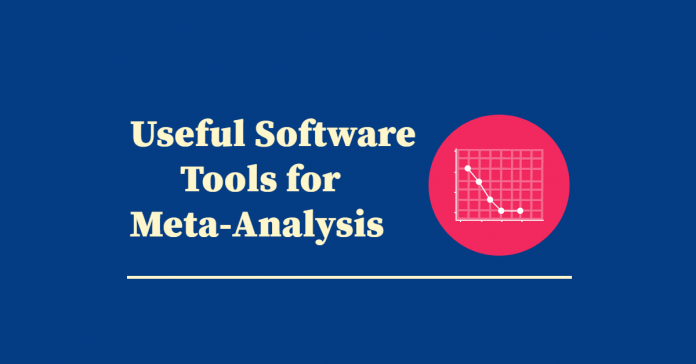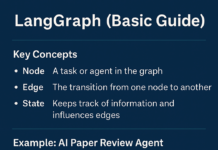Staying up to date with useful meta-analysis software tools for academic research is an important part of any researcher’s workflow.
In this blog post, I will describe some useful software tools for data synthesis.
In my earlier post on “Best Digital Tools for Academic Research: Every Researcher Needs to Know”, I already discussed some meta-analysis software tools for academic research.
Here, I am going to share with you some software tools for meta-analysis to make your research more productive.
Meta-Analysis is a statistical technique for integrating the findings of several studies.
It is often employed in systematic review and is quantitative methodology for synthesizing previous studies and research on a particular topic into an overall finding.
Meta-analysis lets you collect, compare or combine results from different studies and interpret using statistical methods facilitating statistically guided decisions about the reliability of results across a range of studies.
Useful Software Tools for Meta-Analysis
Here is a list of various types of freely available software tools to use when performing meta-analyses.
Lets get started
# MetaLight
MetaLight has been designed and developed for supporting the teaching and learning of meta-analysis.
The software tool for performing meta-analysis is publicly available. You can run on your machine using the Silverlight browser add-on.
Below is the snapshot of MetaLight Application (version 1.1) :

This robust application was developed by James Thomas, Sergio Graziosi, Steve Higgins, Robert Coe, Carole Torgerson and Mark Newman with financial support from the ESRC RDI initiative and the Institute of Education, London.
# Open Meta[Analyst]
OpenMeta[Analyst] is a cross-platform open-source software for advanced meta-analysis.
This cross platform software was developed by the Center for Evidence-Based Medicine at Brown University.

The flexible, user friendly software tool works on Yosemite (10.10), Microsoft Windows 8-64 bit, Windows 7.
But, it does not support 32 bit versions of windows operating system.
OpenMeta[Analyst] allows you to perform meta-analyses of binary, continuous, and diagnostic data.
It is available free of charge.
# Metafor
The Metafor package is a free and open-source add-on for conducting meta-analyses with the statistical software environment R.
This package was written by Wolfgang Viechtbauer. The ‘metafor’ stands for ‘META-analysis FOr R’.
Below is an example of forest plot using metafor tool:

Metafor lets you calculate various effect sizes and outcome measures frequently used when performing meta-analysis.
Moreover, this module contains functions for producing various meta-analytic plots and figures.
Additionally, it caters a variety of models and analysis approaches.
Normal and advanced methods for drawing inferences from meta-analytic data are included in the kit.
You can install the latest release (CRAN– Comprehensive R Archive Network) of this tool within R through the following command:
install.packages(“metafor”)
In order to upgrade to the latest version you use the above command if the software is already installed on your machine.
# OpenMEE
OpenMEE is an open-source, cross-platform software tool for ecological and evolutionary meta-analysis.
Once you click on on LaunchOpenMEE.exe, you will see the following spreadsheet:

Using this software tool you can perform standard, cumulative, subgroup, bootstrapped meta-analyses.
Besides, it depends on R for executing its analysis. You can export your analysis findings as text, pdf, png format.
Moreover, you can add results into different software like Microsoft Word.
This software tool works on Mac OSX El Capitan (10.11), Mac OS X Mountain Lion,
Microsoft Windows 10, Windows 8-64 bit and Windows 7.
# Meta-Essentials
Meta Essentials is a free excel tool for meta-analysis. It also works with WPS Office 2016 (Free).
It makes it easier to combine and synthesis effect sizes from various studies.
You can use this flexible and robust tool for both teaching and research purposes.
Findings of any meta-analysis snapshot is depicted here:

If you want to access the user manual for the Meta-Essentials then please go through the link.
This user manual are licensed under the Creative Commons Attribution-NonCommercial-ShareAlike 4.0 International License.
# NetMetaXL
NetMetaXL is an freely available Microsoft excel based tool for network meta-analysis.
This software allows you to perform Bayesian NMA without having to deal with all the hassles of Winbugs.
In addition to that it lets you generate figures for sharing and use in your papers.
You can download NetMetaXL add by providing your contact information through the link.
The following software are required to run the NetMetaXL on your machine :
- Microsoft Excel 2007 and higher
- Microsoft Windows 7 or 8
- WinBugs Package
This Microsoft excel add-in allows you to perform a Bayesian network meta-analysis using WinBUGS.
The NetMetaXL tool makes it simple to prepare and enter data, and run network meta-analysis, with the results displayed in an Excel spreadsheet.
# JASP
JASP is free, open-source software supported by the University of Amsterdam,Netherlands.
The interface of the data synthesis application is intuitive and similar to SPSS.
The new release of this software supports the following commonly used techniques for meta-analysis:
- fixed and random effects analysis
- fixed and mixed effects meta-regression
- forest and funnel plots
- trim-and-fill
- fail-safe N analysis, etc
The powerful, user friendly software tool works on Microsoft Windows, macOS, Linux.
# Review Manager (RevMan)
In order to prepare and maintain Cochrane Reviews the Review Manager(RevMan) has been designed and developed.
It provides a template for organizing the review and allows for electronic submission to Archie, the Cochrane Information Management System.
RevMan facilitates the execution of meta-analyses as well as the graphical analysis of findings using forest plots.
The easy-to-use tool works on Microsoft windows operating system.
# MetaGenyo
MetaGenyo is a simple, ready-to-use software which has been designed to perform meta-analysis of genetic association studies.
It is completely free software.
Graphical User Interface (GUI) of MetGenyo is given below :

Using the tool you can execute sensitivity, publication bias and subgroup analysis. In addition to that you can also generate the forest plot.
If you want to know details please go through the link.
# PyMeta
The Pymeta is an online meta-analysis tool. Using PythonMeta, a Python package of Meta-analysis, the powerful online tool has been created.
The online web app performs some Evidence-based medicine tasks, such as:
- Combining effect measures
- Heterogeneity test
- Subgroup analysis
- Cumulative meta-analysis
- Plots drawing: forest plot, funnel plot, and bar-line.
A snapshot of PyMeta meta-analysis web app is given below:

Here, I create a snapshot using a sample of continuous data. In addition, you can also use sample of binary data as well as sample of subgroup through the intuitive interface.
In order to install the package you use the command $ pip install PythonMeta.
Besides computer, you can use this software through android and iPhone based mobile phone.
In this blog post, I briefly described some useful software tools for Meta-Analysis.
Hopefully, this post was useful to you! What other software tools for meta-analysis have you used for the academic research ?
We would love to hear from you. Please feel free to comment below.














